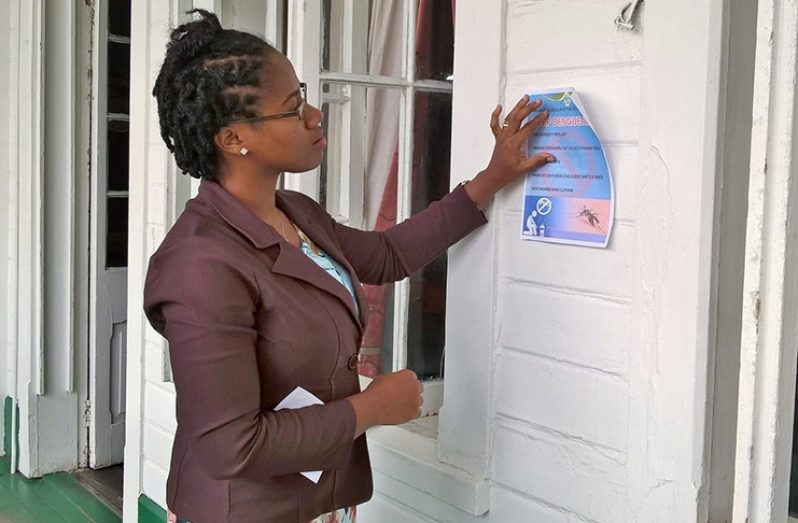THE Mayor and City Council (M&CC) will carry out a massive clean-up activity on Sunday, starting at Stabroek Market, in a bid to keep the city clean and keep dengue at bay.
At a press conference to detail their planned activities for prevention of the outbreak, Medical Officer of Health, Dr. Suzette Reynolds, of the M&CC’s Public Health Department, offered that the intention is for the Vector Control Department to begin spraying daily in communities from Wednesday. She is not sure, however, if the M&CC has the resources to get this done.
Acting Town Clerk, Sharon Harry, said vendors and other volunteers are expected to come out and help with the exercise on Sunday, which is aimed at minimising the likelihood of the outbreak.
Reynolds referred to dengue as a deadly virus, and a very vicious cycle.
According to her, the routine work by the Vector Control Department would not be enough to deal with this issue. Over the next two months or so, she said the department will try to incorporate other departments to get the work done.
Reynolds informed that while the corresponding department in the Ministry of Public Health contacted the M&CC lately, no specific details are available as to how assistance will be provided.
SYMPTOMS AND PREVENTION
Reynolds explained that dengue is a viral infection caused by mosquito bites. Some of the symptoms include severe headaches, a high fever, pain in the muscles, bones and joints; pain behind the eyes and digestive issues like vomiting and diarrhea. It can also be accompanied by a rash, but the absence of rash does not mean there is no dengue. There may also be bleeding from the mucus membranes. There can even be hemorrhagic shock, which can end the life of the person affected.
“A mosquito infected bites someone and when this person becomes infected; if they are not isolated under nettings and so forth, a healthy mosquito can now bite that sick person and get the dengue virus and then transmit it to other persons. So it’s a very vicious cycle,” Reynolds said.
The symptoms appear at least four to seven days after the infected mosquito would have bitten the person and after that incubation period, the symptoms start with very high fever, pain when moving the eyes, pain in the main joints, bones and muscles; rashes throughout the body, mild bleeding from the nose or gum, and a tendency to bruise easily.
According to Reynolds, persons with chronic diseases are more at risk such as those with diabetes, renal problems, asthma, and liver diseases. Pregnant women or recent post natal women, infants, and adults over 60 years of age, are also more prone to the virus.
“Someone who has had it before may not get it again. If a patient has had dengue type one in the past, and a mosquito bites them that carry the same type one, they will not be infected. But if a mosquito that carries types two, three or four bites them, they will be infected and very much likely will suffer a worse form of manifestation of that illness,” Reynolds explained.
According to her, the main prevention mechanism is isolation under netting for infected persons. “We should use screens on doors and windows, and if they don’t have such, keep them shut. Especially for children, allow them to wear long sleeve shirts and pants and footwear when going outdoors, especially in the night time. Use insect repellant. Limit your exposure, especially at the time of dusk and dawn because that’s when the mosquitoes are more active and do not give them a place to breed.”
Reynolds informed that the mosquitoes breed in both clean and dirty water. “Preventing dengue starts with you. You can do simple things to avoid the transmission of dengue,” she said.



.jpg)








